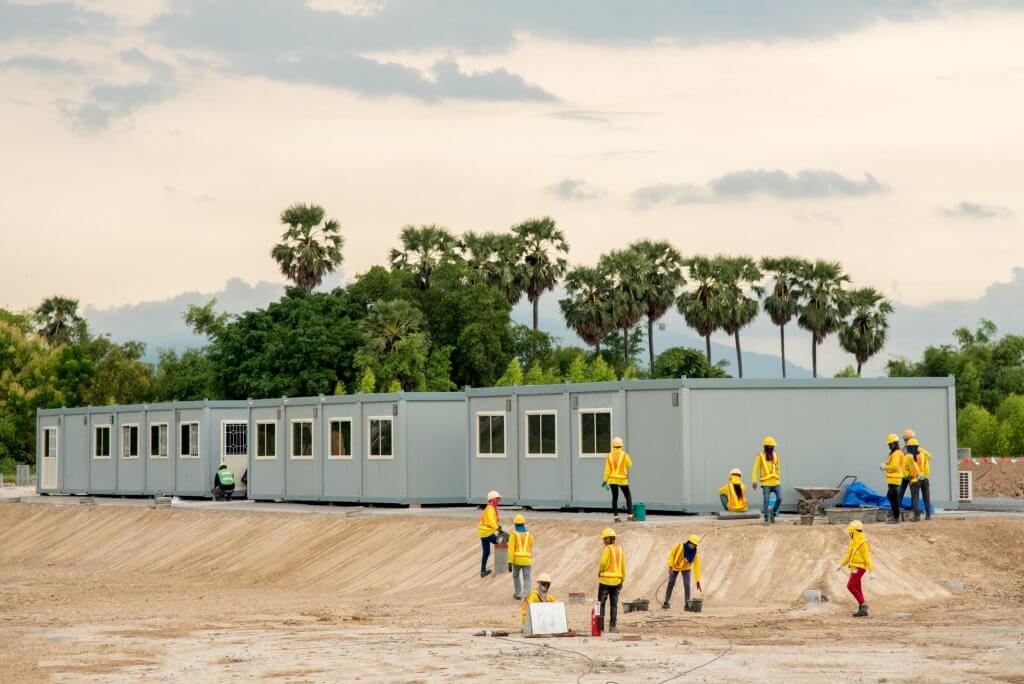February 14, 2024
Table of Contents
Introduction
Lower Costs
Increased Efficiency
The Weather Factor
Protecting the Environment
Conclusion
You can’t go far without noticing a project under construction. Our great nation is one borne out of expansion; no industry embodies this ideal more than construction. From coast to coast, buildings, homes, schools, and world-class structures are opening their doors and welcoming citizens with open arms at a pace we’ve never before seen. Much of this explosive growth with rapid turnaround times is directly attributed to modular construction.
Modular construction is an industry game changer. By definition, modular construction is a method that calls for a structure to be built off-site instead of the traditional on-site operation. The same materials are used with the same standards governing the processes. Upon completion, the finished product which was constructed off-site is no different than what would’ve been done on-site. While the end results are the same, modular construction has several benefits.
Lower Costs
Costs are always a concern with construction projects, especially if you’re a contractor. Profit margins and costs are directly related, and any chance a contractor has to reduce cost and increase profitability should be explored, as long as there is no compromise in the quality of work. Modular construction offers contractors a means to lower their costs, in some cases by as much as 35%. These savings can be reallocated to other projects or areas that help them grow their businesses and provide a higher level of service.
Increased Efficiency
Cost savings and output go hand in hand. Improvements in these two essential areas are why so many contractors are opting to use modular construction for their projects. Construction worksites are busy, often chaotic places with a dizzying array of parts, people, and pieces moving to and from. This kind of movement offers the perfect recipe for output lags as the smallest slip can put a timeline, and the associated profits, at risks. That’s not the case with modular construction. Components of a project are built in factories off-site, so all the workflow challenges typically found in an on-site aren’t factored into the efficiency equation.
The Weather Factor
When it comes to construction, regardless of whether it’s commercial, residential, or somewhere in between, the weather always has a say in how a project flows. Even the most skilled contractor, project manager, or leader has no choice but to bow down to the power of nature. While there hasn’t been technology created to overcome the unpredictability of weather, modular construction comes close. Modular components are built indoors in factories where the weather has no impact. For example, it could be raining, snowing, or flooding on the outside, but on the inside, the technology that drives modular construction allows workers to continue their efforts while focusing on final delivery and timeline integrity.
Protecting the Environment
We only have one planet, and everyone has to do their part to protect it, including the men and women in the construction industry. Millions of pounds of trash and waste are created each year due to the various buildings and structures professionals erected with this industry. Using modular construction allows professionals to reverse the trend of harmful operations that damage the planet. With modular, the amount of energy needed to power a site decreases, material wastes are diminished, and materials that would otherwise be sent to waste are now recycled to be used in future opportunities.
Conclusion
Building smarter is something every construction professional should ascribe to, and modular construction is one way to achieve this goal. From a cost perspective, modular construction helps contractors save on resources and build more robust profit margins that can be re-invested into their businesses. Efficiency is another area modular construction drives by removing many factors that limit performance, including the weather. Lastly, modular construction offers environmental protection measures that help preserve the planet while providing a competitive advantage to contractors who choose to employ this incredible solution.
AIA Contract Documents software allows you to efficiently create, share, and manage the industry’s leading construction documents. Request an ACD5 Product Demo Here.
AIA Contract Documents has provided this article for general informational purposes only. The information provided is not legal opinion or legal advice and does not create an attorney-client relationship of any kind. This article is also not intended to provide guidance as to how project parties should interpret their specific contracts or resolve contract disputes, as those decisions will need to be made in consultation with legal counsel, insurance counsel, and other professionals, and based upon a multitude of factors.

